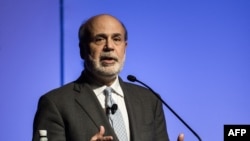The Royal Swedish Academy of Sciences announced Monday that three U.S.-based economists won the 2022 Nobel Memorial Prize in Economic Sciences "for research on banks and financial crises."
The winners are Ben Bernanke, former head of the U.S. Federal Reserve and currently with the Brookings Institution in Washington D.C.; Douglas Diamond of the University of Chicago; and Philip Dybvig of Washington University in St. Louis, Missouri.
This year's laureates "have significantly improved our understanding of the role of banks in the economy, particularly during financial crises. An important finding in their research is why avoiding bank collapses is vital," the academy said.
The Chair of the Committee for the Prize in Economic Sciences, Tore Ellingsen, said that their “insights have improved our ability to avoid both serious crises and expensive bailouts” in banking systems.
The beginnings of Bernanke, Diamond, and Dybvig's analysis date to the early 1980s and ever since their findings "have been of great practical importance in regulating financial markets and dealing with financial crises," the academy said.
The statement from the academy said Diamond and Dybvig’s theory shows how banks offer an optimal system and "by acting as intermediaries that accept deposits from many savers, banks can allow depositors to access their money when they wish, while also offering long-term loans to borrowers."
Diamond also has shown how banks perform a societally important function as intermediaries between savers and borrowers by "assessing borrowers' creditworthiness and ensuring that loans are used for good investments," according to the award committee.
The academy said Ben Bernanke analyzed the Great Depression of the 1930s, the worst economic crisis in modern history, and has shown how bank operations "were a decisive factor in the crisis becoming so deep and prolonged."
Bernanke has demonstrated, the academy said, that "when the banks collapsed, valuable information about borrowers was lost and could not be recreated quickly," and therefore, "society's ability to channel savings to productive investments was thus severely diminished."
The winners share an award of $900,000.
The Nobel Memorial Prize in Economic Sciences was not included in Alfred Nobel's will. Officially known as the Sveriges Riksbank Prize in Economic Sciences in Memory of Alfred Nobel, it was established in 1968 by the Swedish Central Bank in memory of Alfred Nobel to mark the bank’s 300th anniversary.
It was first awarded in 1969 and has been funded by the bank since then.




